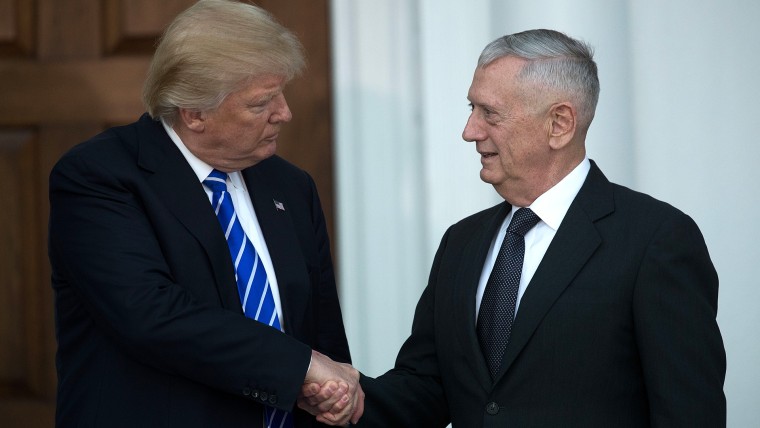Some key posts in Donald Trump's cabinet have not been filled, but the president-elect has made a decision regarding the Pentagon,
choosing retired Marine Gen. James Mattis as the nation's next Defense Secretary.
Trump made a surprise announcement of the expected appointment during a rally in Cincinnati on Thursday night, as the crowd cheered wildly. "We are going to appoint Mad Dog Mattis as our secretary of defense," Trump said theatrically. [...]Mattis' confirmation by the Senate is not assured. Only three years out of uniform, he would also need a Congressional waiver for a 1947 law that requires a seven year wait.
No one has questioned Mattis' decorated military service, and by all accounts, the retired general enjoys the respect and admiration of those who've worked with him. A variety of Trump cabinet nominees have drawn criticism for being ridiculous, but there's no chance of Mattis facing that kind of pushback from anyone.His nomination, however, does raise some institutional questions that aren't easy to answer.Civilian control of the military is a bedrock principle of the American system of government. Indeed, liberal democracies the world over have recognized the importance of this basic idea. It's precisely why current U.S. law prevents retired military service to be out of uniform for at least seven years before taking a post like this one -- and Mattis only retired from active duty three years ago.As
Rachel noted on the show last night, Sen. Kirsten Gillibrand (D-N.Y.), a ranking member on the Senate Armed Services Subcommittee on Personnel, has already announced her opposition making an exception to federal law for Trump's pick. "While I deeply respect General Mattis's service, I will oppose a waiver," the New York Democrat said. "Civilian control of our military is a fundamental principle of American democracy, and I will not vote for an exception to this rule."It'd be helpful to hear Trump explore this in more depth. The president-elect, who seems enamored with Mattis' "Mad Dog" nickname, said at a rally last night that the retired general is "the closest thing to Gen. George Patton that we have."That very well may be true -- but while Patton crushed the Nazis in World War II, no one ever thought to make him the Secretary of Defense.It is, after all, an administrative job: the person in this office doesn't lead troops into battle; he or she runs a large cabinet agency and oversees a massive budget. It's possible someone told Trump, "You need to pick a Pentagon chief," and the president-elect made the military association and started thinking of generals, but that's really not how this is supposed to work in the American tradition. In fact,
seven different Secretaries of Defense -- including Republicans like Dick Cheney and Democrats like Ash Carter -- never served in the military before leading the Defense Department.Mattis' record of service is exemplary, but the controversy is less about him and more about democratic principles. It should make for an interesting debate.
Postscript: There's also the broader question of Trump eyeing military brass for all kinds of top posts in his administration. The
Washington Post reported earlier this week, before the Mattis announcement, that the president-elect is eyeing
five former generals and admirals for important positions, which would be unprecedented in American history.
The United States, like most advanced democracies, has historically kept a relatively clear line between the civilian command that gives orders and the military that follows them. In fact, having three or four former high-ranking military officers in the top ranks of the administration would put the U.S. in the company of non-democracies like Thailand or Zimbabwe. Most healthy democracies — whether that's Australia, Canada, Germany, or the United Kingdom — keep the military and civilian worlds quite separate.At most, advanced democracies may have one or two military officers in top jobs in the executive branch.Most democracies have none. But autocracies are different.
A
New York Times report added that Trump's preference for surrounding himself with retired military leaders "worries national security experts and even other retired generals, who say that if Mr. Trump stacks critical jobs purely with warriors, it could lead to an undue emphasis on military force in American foreign policy."
